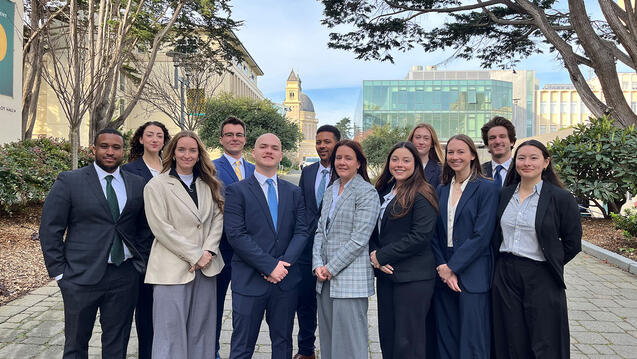
Streaming's Dream Team

Five USF Law alumnae are part of the deep bench that streaming entertainment juggernaut Netflix calls its “Dream Team.”
Referencing the legendary 1992 U.S. Olympic basketball roster that included Michael Jordan, Magic Johnson, Larry Bird, Charles Barkley, and Karl Malone, the company’s recruitment site says it “model(s) ourselves on a professional sports team, not a family. Families are about unconditional love … Professional sports teams, on the other hand, focus on performance and picking the right person for every position, even when that means swapping out someone they love for a better player.”
The five players described here — Mary Katherine Ashmore ‘19, Masha Koltsov ’13, Maahum Chaudhry ’14, Simron Gill ‘12, and Maya Giladi ’13 — bring their expertise to a range of business units, shaping how Netflix navigates the evolving entertainment landscape. Here, they reflect on their legal lives on the Netflix court, describing their various areas of entertainment law, sharing what a typical workday looks like, and explaining why they love working for a company that strives to make the most out of each of its “player's” talents.

Masha Koltsov
As director of Product & Tech Legal (Studio), Masha Koltsov supports Netflix’s Content Innovation and Operations team, an intersection of technology and creativity. “Depending on a project or initiative, I may be assessing legal risk, drafting or reviewing contracts, or summarizing legal guidance and answering questions.”
Something she appreciates about Netflix is the established collaborative environment across divisions. “I feel lucky to be considered a partner to my business teams — I’m brought in early on. Instead of being seen by our business team as a legal 'blocker,' I participate in and advise on what a deal could look like and issue-spot early on.”
The breadth and diversity of practice offered by entertainment law was surprising to Koltsov. “There are so many parts of the content production workflow that lawyers touch — from rights acquisition, to negotiating deals, to where I am now on the technology side that supports content production with tools and services.” And while she noted that in many ways, entertainment law has been dominated by men, she thinks that Netflix is leading the charge when it comes to championing women in the field.
Koltsov acknowledges that the challenges she faces as a working mother are universal. “The hardest part for me has been finding the balance of advancing in my career with managing my family obligations.“ Luckily, Netflix has cultivated a culture where working mothers are supported.
“We really focus on inclusion and it shows in the legal team Netflix has built,” Koltsov says. “There are many women, including in senior leadership.” She emphasized that this representation at the highest corporate levels has helped shape the culture of all its teams.
When asked what she’d say to USF Law students wanting to follow in her footsteps, Koltsov stressed the importance of keeping an open mind. Her own willingness to learn about new (and seemingly non-adjacent) legal areas has benefitted her career: “When I first came to Netflix, my role was different than the production work I was previously doing, but supporting the Visual Effects and Virtual Production teams (who respectively create images used in film and use technology to digitally capture images) provided an understanding of the vendor ecosystem and shaped many of the considerations I look at now.”

Maahum Chaudhry
If you’d asked Maahum Chaudhry when she was at USF Law how she thought she’d put her JD to use, public interest work would likely have been top of the list. But thanks to chance and the right timing, she landed in the role she now describes as meant for her.
She explains her work as the majors manager on the Rights Management team at Netflix as leading “a small but mighty team, and interacting with folks in many parts of the company. I talk with colleagues in accounting, marketing, licensing, operations, and engineering each day, which helps me get a more holistic perspective on what the company is doing. I’m glad I’m not siloed in my own little legal bubble; it makes all our hard work feel more rewarding when I get to see how my efforts fit as a small piece of the greater puzzle.”
Also rewarding is the way Netflix allows her to integrate her work life with the rest of her life. “I’m unapologetic about my identity and believe in bringing my full self to work. My religious identity is visible on me,” she says [Chaudhry is Muslim and wears a hijab], and adds, “I believe I am able to do my work well because I don’t have to add to my mental load turning any part of my identity ‘on’ or ‘off.’”
Chaudhry’s tasks include closely reading license agreements in order to understand and disseminate necessary information across the company, including to non-legal counterparts. Her team then inputs that data across various internal databases and shares the information with cross-functional partners. “Our data input greenlights when a title can be available live on Netflix,” she says, so an obsession with details is a must.
Her role is about more than a preternatural ability to digest and disperse complex legalities, though. “My day also heavily focuses on managing my team of direct reports and advocating for their needs, be it dealing with a difficult business partner or pushing for tooling enhancements to make their work more efficient.”

Mary Katherine Ashmore
As counsel on the Experiences team, Ashmore oversees all legal aspects of Netflix Attractions, a slate of content-related experiential opportunities for fans. This includes one of the company’s newest ventures, Netflix Houses, described as “rotating immersive experiences including exclusive merchandise, food, drinks, and much more,” which opened in Dallas and Philadelphia in mid-2025; Netflix Bites Restaurant in Las Vegas; and Netflix Licensed Experiences (think entertainment venues that immerse fans in hit shows like Bridgerton or Stranger Things) scattered throughout the world.
Of the wide variety of properties she touches, she says, “I am lucky to support a wide array of colleagues on many different business teams. In a single day, I can find myself negotiating a talent voiceover engagement for one of our experiences, advising the marketing team on IP usage and approval, or collaborating with the Music Legal team on song clearances. One of the exciting things about the job is that no two days are the same (aside from starting every morning with a brisk walk with my Australian Shepherd, Georgia).”
Ashmore was as surprised as Koltsov by just how broad entertainment law is. She notes, “Sure, there are lawyers who represent actors, writers, and directors in film and television, lawyers who help musicians and songwriters, but I don’t really do any of that. As in-house counsel, our team supports several business units and provides comprehensive legal guidance where needed. We’re essentially air traffic controllers at a very large and busy airport — supporting many different teams from a legal perspective and ensuring everything is taking off and landing smoothly.”
She credits her former USF Law professors with shaping the way she thinks and approaches the law, saying that “I cherished my time in law school largely due to the incredible professors. I have so many fond memories, like Levi Strauss campus tours with Professor Onda, essay review sessions with Professor Travis ('Shall we? We shall!'), and discussions about current entertainment trends with Professor Harvey.”

Simron Gill
As Principal Counsel, Intellectual Property, and Content Legal, Simron Gill's legal portfolio spans animation, games, film, and series. “I handle issues from the deal stage to production and distribution, guiding the company through the legal complexities of everything from rights clearance and licensing to fair use and defamation risks,” she says.
No two days look alike. “I may get a question from a business and legal affairs executive, who is negotiating an underlying rights agreement about enforcement rights or indemnification provisions. From there, I may have a show-level clearance question get escalated to me about recreating a real company in a series.”
But the range and complexity are what she loves about the work. “Being in entertainment means I get to play a small part in the stories and creative process that result in a product that helps people have fun, relax, share new ideas, or have a good emotional cry. I also enjoy solving difficult problems and explaining issues in multiple ways so that non-legal and legal folks can understand the issues easily.”
Gill stresses that being in-house requires knowing the entertainment business inside out … and admits that there was a steep learning curve for her. “Even though I was basically raised in my parents’ video rental store when I was young, I didn’t have any ties to the entertainment industry growing up. My first few years at Netflix were a big adjustment as I learned more about the industry.”
Gill is grateful for the company’s “Dream Team” aspirations when hiring. “My boss, Barbara Quinn, is also a USF Law alumna and a mother. She’s been a great mentor and understands the importance of prioritizing significant family moments. As a professional, there will always be something you have to give up to build a career you’re proud of, but it makes it worth doing when you are also developing in an industry and field you are passionate about.

Maya Giladi
Business and Legal Affairs executive Maya Giladi spends her days negotiating deals on behalf of the Netflix studio to engage talent — including actors, writers, producers, directors, and other creatives — for the company’s many scripted series.
Giladi credits what she calls USF Law’s “excellent IP program” with helping direct her to entertainment law. “Though I don’t practice directly in copyright or trademark law now, I remember loving those classes and being drawn to this field.”
In that field, Giladi delights in a role that she compares to solving a creative riddle, saying, “I love the satisfaction of closing a deal after heavy negotiations, especially when it is for ‘must have’ talent. I love finding innovative and flexible ways to close deals without disrupting our company precedent. It’s great to be able to meet and balance the needs of all cross-functional partners with whom I work.”
The confidence to perform said heavy negotiations is well-earned, having honed her teeth on the business affairs side of entertainment law, which traditionally tends to be more male-dominated.
“Over time, I learned to stop saying 'sorry,’ and that I don’t need to always use an exclamation point to soften my tone,” she says. And though this happens less often now than in her early days of practice at other entertainment companies, Giladi feels she had to work harder to be taken seriously. “However, Netflix has a lot of women in leadership. I think this company paves a strong path for women, including my own boss, Starr Silver-Baker, and the head of our entire US/Canada Business & Legal team, Mandy Schaffer — both of whom are working mothers.”
As is Giladi. “I now have a one-year-old daughter, and I think about both the world I want her to grow up in and the type of working mother I want her to see. Hopefully, I’m doing her proud.”


